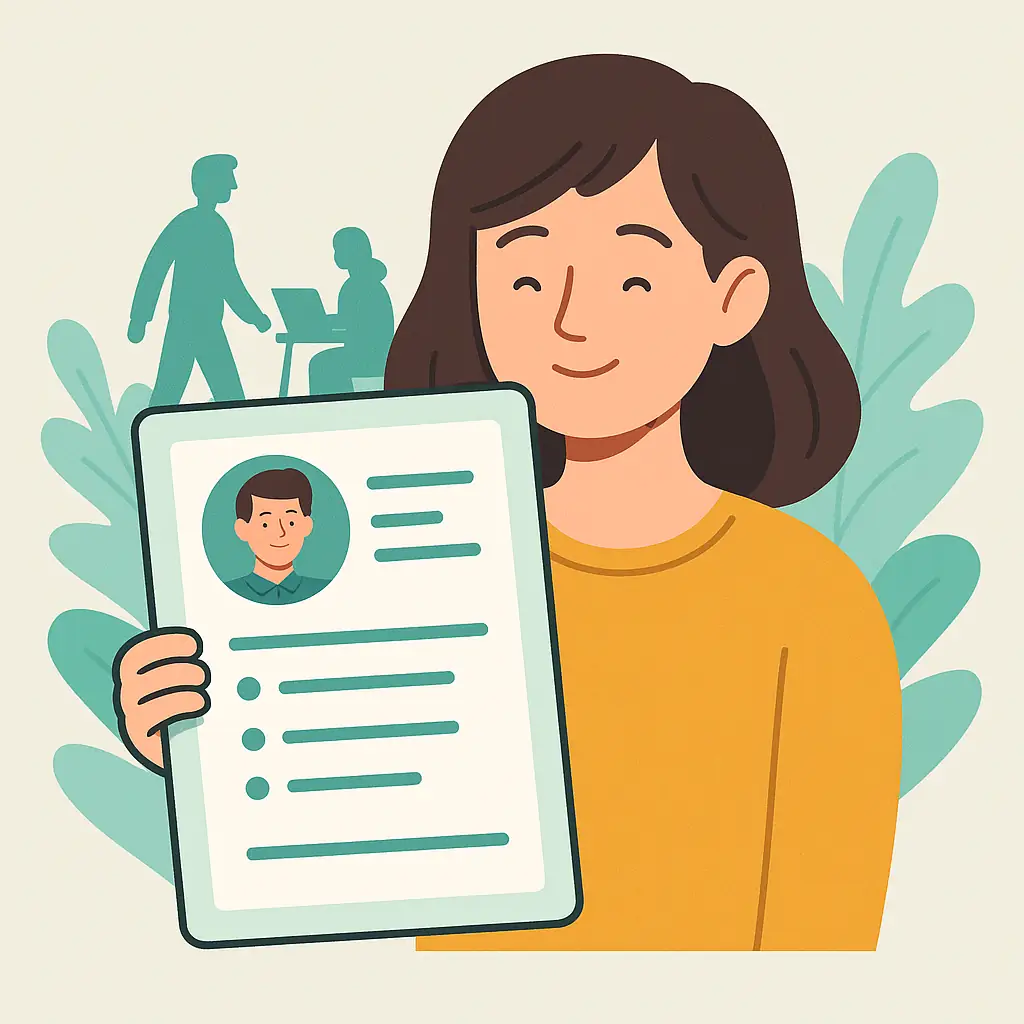Have you ever been asked to describe yourself in a few words? Your thoughts become blank and your whole vocabulary vanishes. The few words that remain in your thoughts feel extremely generic which is far from what you would want to say when attempting to project your best self.
However, this is rather typical as interviews are hectic and it’s not always easy to deliver powerful statements promptly. Nevertheless, psychology demonstrates that our words have the power to shape emotions and guide action. This article will teach you how to professionally define oneself using more than 100 carefully selected words.
These words can help you pass ATS software and are appropriate for cover letters, resumes, and interviews which can help you confidently and clearly highlight your skills in writing, speaking, and networking.
It also offers advice on how to use descriptive terms throughout the hiring process as well as a list of words and adjectives you can use to describe yourself to a potential employer.
The Need to Describe Yourself
The need to tell hiring managers about yourself and highlight your potential occurs more often than you’d think. Some most common scenarios include:
- Resume: Particularly the headline and summary section.
- Cover Letter: To highlight your character and strong points.
- College Applications: To highlight your knowledge and background proficiency.
- LinkedIn Profiles: Especially the “About” section and the headline.
- Job Interviews: To answer “How would you characterize yourself?
Choosing the appropriate words is crucial whether writing or speaking!
Click Here :- How to Introduce yourself in an Interview
Why do Interviewers Ask “Describe Yourself?”
Let’s first talk about job interviews! An interviewer wants to learn a few things about you when they ask you to sum up who you are in a few words, including:
- How your qualifications align with the position you are seeking.
- Your self-perception, level of groundness, and your soft skills.
- If your personality and characteristics fit in with their culture.
This question may be asked in a different way, like:
- How would you characterize yourself in three to four words?
- How do others describe you?
- What are your strongest points?
- Summarize who you are in a sentence.
Your response to this question can help you ace your job interview if you’re well-prepared. However, you risk making a poor impression if you’re anxious and unable to come up with a good response.
Therefore, “Tell me about yourself” is a great way to highlight the traits that make you a good fit for the job but this brief description of oneself should be regarded literally. Your response needs to be:
- Concise: Make a shortlist of a few adjectives that best define you instead of creating a whole narrative. You don’t need to write a thesis to support qualities like “empathetic” or “resilient,” but the hiring manager may ask you to explain your word choice, so, focus there.
- Goal: Avoid trying to sound too cool but select adjectives like “hard-working” or “curious” that others would truly use to characterize you and you also could prove.
- Applicable: Ensure that the words you select are relevant to the position for which you are applying. Being “meticulous” is a fantastic choice if you work in finance but it’s the worst one if you’re attempting to become an emergency medical technician.
How to Pick the Right Words to Describe Yourself?
Make sure you’re picking words that actually work for you before you start reading the list. A few quick tips to follow are:
- Examine the job description and select terms that align with the skills, attributes, and principles the company highlights. Your resume’s descriptive language must match the job posting’s keywords in order to pass ATS filters.
- Avoid using ambiguous phrases and overused buzzwords like “go-getter” or “ninja”; instead choose adjectives that are confident, unambiguous, and have real meanings, such as “dependable,” “analytical,” or “collaborative.”
- Select only signifiers that you can support with examples. Provide instances of how you demonstrated it if you claim to be “adaptable. Stay loyal to who you are as authenticity is more noticeable.
Additionally, adapt the tone to the situation:
- Resume: Speak in a direct, professional, and goal-oriented manner.
- Cover letter: Highlight your motivation, values, and personality.
- Interview: Use language that sounds natural when spoken aloud while maintaining a confident and professional demeanour.
Practice your Response
You should prepare thoroughly before you walk on stage because a job interview is a performance of sorts. You will feel more comfortable answering questions during the interview if you have prepared and written truthful responses that highlight your personality and skills. You can refine your responses and choose the finest adjectives to describe yourself by practicing your answers with a mentor, peer, or trusted friend.
Moreover, the words you use to define yourself can make a big difference when the tone and expectations of a resume, cover letter, and interview differ. Context-specific advice on how to appear assured, relevant, and genuine in any professional situation include:
Describing Yourself on a Resume
The words you use to describe yourself on a resume should be as strong as you are in order to convey how well you fit the job. Specific sections, such as your skills section, summary, or important achievements are the best places to include powerful and focused adjectives although your accomplishments are reflected throughout the paper.
Selecting non-generic resume adjectives will help you stand out from a sea of similar applications and increase your chances of getting the interview. Advices to pick the right words to use on a resume to define yourself are:
- Customize for the position: Go over the job posting and align the self-descriptive language on your resume with the skills, characteristics, and values the employer highlights.
- Keep it professional (but genuine): Avoid appearing robotic by using language that conveys a strong work identity, such as dependability, drive, and attention to detail. Rather, be pleasant without sacrificing professionalism.
- Emphasis on strengths: Choose descriptive words that convey certain values, such as “strategic” or “efficient,” rather than ambiguous ones like “nice” or “hardworking.”
- Align tone with industry: A creative career may permit bold and emotive language while a finance or legal position requires accuracy and a more official and organized tone.
- Provide evidence: Don’t just claim to be “innovative” but back it up with a success story or a bullet point that demonstrates your skills.
Describing Yourself on a Cover Letter
You can demonstrate personality and emotional intelligence deeply in your cover letter. It allows you to share why you are a fantastic fit beyond job titles and bullet points whereas your resume emphasizes outcomes and accomplishments. The hiring manager will find your message more memorable and relatable if you use a cover letter to define yourself carefully.
Advices to pick the right words to use in a cover letter to define yourself are:
- Align with the company’s tone: Examine the language used by the business on its website or in job postings. Pick language that reflects their values and voice, whether it’s empathetic and mission-driven or incisive and performance-oriented.
- Don’t just state but show: It is acceptable to describe yourself as “passionate” or “collaborative,” but supporting these claims with instances as a cover letter is the best place to provide background and examples.
- Keep it professional but not too personal: A cover letter should mix professionalism and warmth, even though it may be a little more personal than a resume.
- Emphasize values and soft skills: Emotional intelligence can be demonstrated in cover letters by using phrases like sympathetic, considerate, trustworthy, and flexible.
Describing Yourself in an Interview
Questions such as “What are words you’d use to describe yourself?” or “What are your strengths?” can make interviews difficult and merely increase the strain. Many candidates become speechless or fall back to cliched and ambiguous responses like “nice,” “hardworking,” or “team player,” which may be accurate but rarely leave a lasting impression.
The most common issues candidates frequently encounter are:
- Giving cliched answers or freezing under pressure.
- Using catchphrases without providing examples to support them.
- Having trouble finding a balance between modesty and confidence.
- Selecting characteristics that are incompatible with the position or corporate culture.
Advices to pick the right words while introducing yourself in an interview are:
- Keep it conversational: Avoid using terms that are overly professional or scripted; instead use language that seems natural when spoken.
- Be prepared to provide evidence: Be ready to provide a brief illustration to support your words if you claim to be “adaptable.”.
- Strike a balance between confidence and humility: Phrases like “driven,” “reliable,” or “collaborative” convey power without coming across as arrogant.
- Adapt to the role: Take into account what the interviewer is looking for as various roles value different qualities.
- Prepare a few strong adjectives: Be ready with a few powerful descriptions in advance and practice pronouncing them aloud with short examples.
Describing Yourself using Other’s Words
Sometimes expressing how other people perceive you is the best way to define yourself. You may say, “I’m known for being adaptable and calm under pressure” which displays self-awareness in addition to your skills. Additionally, you could say, “Resourcefulness is the word that best describes me as I’m constantly coming up with new solutions to problems.”
Using other people’s comments gives your descriptions more authority and validity. Use the given direct phrase like “My manager once told me I was the most detail-oriented person on the team” or you might also state, “Colleagues often say that I’m reliable and supportive.”
These self-descriptions are effective for cover letters, interviews, and even resume summaries. They give the impression that your traits are genuine because they are based on how other people perceive you.
Unique Words to Describe Yourself
Now let’s move to know those strong and unique words or adjectives to describe oneself after understanding the ways on how and where to utilize them based on situations.
Best Adjectives for Resume
There are many strong words to use on your resume with confidence whether you work in a more traditional and organized business or in a creative field. Some of the best adjectives to use on your resume are:
- Flexible
- Cooperative
- Analytical
- Communicative
- Visionary
- Creative
- Confident
- Detailed-oriented
- Curious
- Motivated
- Empathetic
- Efficient
- Compassionate
- Concentrated
- Logical
- Goal-oriented
- Innovative
- Observant
- Independent
- Methodological
- Proactive
- Driven
- Organized
- Dependable
- Resilient
- Adaptable
- Thorough
- Well-prepared
- Resourceful
- Strategic
They remain powerful when supported by examples or results even after being used frequently. Remember that some words run the danger of appearing flat or buzzwordy if they are not worded properly, making it necessary to use them responsibly.
Best Adjectives for Cover Letters
Qualities and adjectives that are particularly effective when describing your communication style, work ethic, or reasons for applying on cover letter are:
- Approachable
- Vigilant
- Genuine
- Attentive
- Adaptable
- Concerning
- Compassionate
- Considerate
- Confident
- Vigilant
- Intriguing
- Committed
- Reliable
- Detailed
- Respectful
- Empathetic
- Diligent
- Ethical
- Flexible
- Opinionative
- Honest
- Organized
- Well-prepared
- Enthusiastic
- Affable
- Proactive
- Helpful
- Considerate
Best Adjectives for an Interview
Speaking aloud makes some things sound more natural and an interview is all about you and your personality. A list of words that are conversational, shows emotional intelligence, and lead to real and personal examples include:
- Approachable
- Concerning
- Reliant
- Vigilant
- Collaborative
- Flexible
- Calm
- Concerning
- Friendly
- Considering
- Decisive
- Genuine
- Driven
- Understanding
- Good Listener
- Observant
- Curious
- Patient
- Open-minded
- Practical
- Self-aware
- Introspective
- Helpful
- Organized
- Perceptive
- Willing
- Tactful
Pro Tip: Pick one word that best characterizes your work style, your attitude, or how you interact with other people which make sure that your response seems thoughtful and well-balanced (e.g., organized, driven, and collaborative).
Words to Never Describe Yourself Professionally
It goes without saying that there are several terms you should never use to describe yourself in a college application, a resume, or a job interview. These adjectives aren’t actually bad; many of them are excellent attributes to possess. However, they could not sound very professional.
Consider the following scenario: “You are a hiring manager conducting a job interview. They respond as follows when you ask them to describe themselves:
“What would I say about myself? I’m hilarious, amazing, and different.” You surely wouldn’t hire someone like that.”
It would be fine if a friend or coworker said this about you but it’s extreme to call yourself “amazing” in front of a recruiting manager without actually saying anything.
Some top words to avoid while describing yourself are:
- Fantastic
- Dynamic
- Amusing
- Sincere
- Humble
- Capable
- Intelligent
- Unique
- Perfect
- Brilliant
- Hilarious
- Hardworking
- Talented
None of these are negative qualities, yet they might come out as cocky, unprofessional, and unfiltered without any proven instances.
Example of Interview Responses
A few examples of interview responses that highlight your strengths and are suited to various job categories and question types are:
- Example 1: “What are the words that describe you?”
Position: Marketing Administrator
Response: I consider myself to be analytical, creative, and flexible. I enjoy creating original campaigns, examining performance insights, and swiftly modifying plans to stay ahead of trends.
- Example 2: “Tell me about yourself.”
Position: Customer Support Executive
Response: I’m empathetic, patient, and goal-oriented. I constantly make an effort to comprehend client concerns, maintain calmness under stress, and find the most efficient solution to problems.
- Example 3: “What are the top qualities you bring to this role?”
Position: Content Writer
Response: I write with originality, precision, and consistency. My goal is to provide content in an approachable manner whether writing technical documentation or blog posts.
Final Tips for Describing Yourself
Some of the tips that are useful in crafting your answer of describing oneself include:
- Rehearse your response, but do not memorize it word-to-word.
- Give an example while combining two or three strong traits.
- Adjust your language to fit the position and corporate culture.
- Prepare yourself for follow-up questions such as “Can you provide an instance in which you exhibited this quality? “
Conclusion
During interviews, knowing the appropriate words to use to define yourself can have a big impact on how people evaluate you. Choose terms that accurately represent who you are and fit the position, whether you are asked to sum up your personality in one word or to emphasize a few attributes. The correct words, supported by concrete examples, can make you seem like the best candidate from being empathetic to strategic.
Key Takeaways
A few points that this article made everyone learn include:
- Pick words that fit the position: Match your self-descriptive words to the job description to stand out and get past ATS filters.
- Be truthful: Use language that you can back up with actual instances or accomplishments because authenticity builds trust.
- Modify your wording by context: Use professional and result-oriented language on your resume, demonstrate your personality in a cover letter, and conversational language in an interview.
- Stay away from overused buzzwords: Use effective and straightforward phrases like “reliable,” or “strategic” instead of ambiguous ones like “go-getter” or “rockstar.”
- Customize it: Adapt your language to the context and expectations of the interview, cover letter, or resume by tailoring it for different situations.
- Use other’s description: Sharing how other people perceive you might occasionally be the most effective approach to define yourself, seeming believable and authentic.







